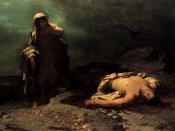In Ancient Greece, women had the traditional roles of an obedient housewife in their everyday lives. These roles where what the men thought as just. In many tragedies of Greek women, the woman appears as strong and defiant and able to carry out matters that would take a lot of courage. The characterization of Antigone in Sophocles' Antigone challenges ones assumptions about the role's and behavior of the typical Greek women. In her defiance of both Creon and his edict she is challenging tyranny and her kin.
"The portrayal of the masculine woman as heroine was fully developed in Sophocles' Antigone." (Pomeroy, 83) Although ancient Greece was a male-dominate society, Antigone portrays a women as being strong and capable of making wise decisions. Traditionally women are characterized as weak and subordinate. Through the character of Antigone, Sophocles displays a women going against the traditional views of society. Sophocles' uses Ismene as a representation of what every woman in Thebes should be like.
Antigone has the opposite viewpoint of Ismene as to rather or not to defy Creon. "You would bury him when it is forbidden to Thebes" (Sophocles, 83). If every women in Thebes were to be like Ismene, and most of them are, then nobody would stand up for what they believe in. For Antigone, death was a small price to pay for what she believed in.
Antigone takes on masculine traits in her defiance of Creon. She shows a defiance of Creon's laws in burying Polynices and as a direct verbal assault on Creon himself. "But for it Creon deemed me guilty of error and of outrage" (Sophocles, 101). Creon becomes angry that a woman questions his sovereignty and condemns her to death even though she was the daughter of his sister, Jocasta. "Creon characterizes Antigone's burial of Polyneices as a masculine assertion of independence" (Droege Paragraph 2). "What man alive has dared this deed?" (Sophocles, 87) he immediately yells out after the guard tells him someone has attempted to bury Polyneices. Creon believes that if he does not follow through on his word the people of Thebes will not respect his authority as king. Creon is devoted to his laws, while Antigone is loyal to her beliefs. Antigone as a woman
acting out of obligation and duty, to the gods, her family and her conscience is the exemplum for her society.
"Creon, a domineering ruler, reveals particular hostility in his relations with the opposite sex" (Pomeroy, 83). Creon himself says that the need to defeat her is all the more pressing because since she is a woman her rebellion upsets gender roles and hierarchy. By refusing to be passive, she overturns one of the fundamental rules of her culture. Women were subjugated and supposed to be silent spectators to the world around them as men's, such as Creon's, search for power fuels there desire to put women down to lessen the possibility of a threat. Antigone is a woman who firmly believed in humanly burying a dead body and whose actions changed the course of Thebian history.
Not only does Antigone defy Creon's tyrant rule but she also defies her kin. Antigone doesn't look at it as if she is the niece of a powerful ruler and she has to set an example for others. She looks at it as though Creon is her uncle and her ruler and that fact doesn't affect her. It seems that for Creon, it isn't even a moral problem to sentence her to death by stoning. It is his obligation as ruler to punish a citizen of Thebes for something that they have done against his wishes. He doesn't even take into consideration that not only is she a woman she is also his niece. "When Antigone disagrees with the law in such a public manner and places herself as the spokesperson for a dissenting constituency, she is threatening Creon with her assumption of public responsibility" (Droege, Paragraph 2)
Antigone in Sophocles' Antigone demonstrates masculine traits in several
ways. She challenges a powerful male establishment headed by her own uncle. Not only does she challenge a family member, Creon is the King of Thebes. Antigone did not run from her death sentence suggest an inherent bravery and obstinacy which the chorus recognizes before her departure to her death. Creon demonstrates through his tyrant rule, the sexist male viewpoint of the ancient Greek world.


